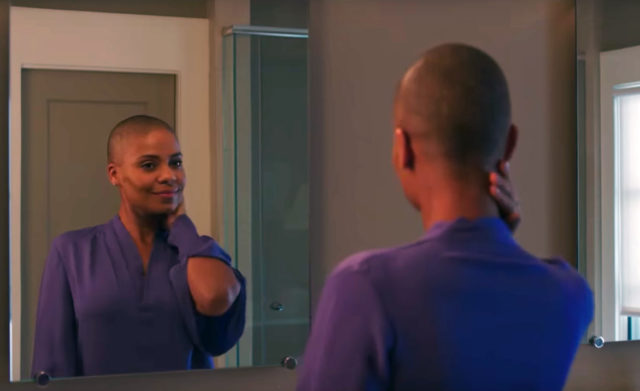
The buzz around the Netflix comedy “Nappily Ever After” swirls around Sanaa Lathan shaving her head on camera. As it should be.
As an Atlanta ad exec, beauty accounts queen and physical appearance perfectionist, her drunken, broken-hearted tantrum with hair clippers is one of the most dazzling moments in her long (“Love & Basketball”) career.
It’s a minute or so of screen time full of tears, laughter, self-destructive anguish and resignation at what she’s done. Lathan plays the hell out of it.
Sadly, the movie surrounding it is a listless affair, starved of laughs if not utterly devoid of charm. Building an empowering romantic comedy around Lathan and Lathan alone was always going to be an iffy proposition. Sexy, vulnerable she can do. Vulnerably funny? Not really.
Maya Angelou called “hair a woman’s glory,” and Violet (Lathan) has taken that to heart. Her mother (Lynn Whitfield) would have it no other way. Even as a child, the kid was warned away from the pool. Being called “Chia Pet” left her frightened of the daily forecast. Rain means frizz.
“I had to be fixed,” she narrates. When we meet her grandmother, we get it. Hair and appearance obsession passed down, generation to generation.
A successful ad woman whose speciality is “perfect woman” campaigns, Violet’s expecting her live-in love (Ricky Whittle) to propose at her carefully-planned birthday party. She gets a chihuahua instead.
Seeing as how she lost a big chunk of her mane in a last minute hair salon accident (relaxer), got an emergency weave to maintain the aura of perfection, we can understand her pique.
The film, based on the Trisha R. Thomas novel, has “chapters” named after every phase of hair Violet experiences. “Weave” is one, “Bald” is the one that sticks, the one that comes right after “Blonde.” Yeah, she gets a dye job in “f— me blonde” to get herself back “out there” after the breakup, which only lasts for one ill-advised bar pickup.
Then comes the drunken self-pity, the tantrum and the movie’s money scene. Chase that one with the morning after (she did a half-assed job of it), her mother’s hysteria, the way she physically shrinks without her hair, her “glory.”
Only her dad (Ernie Hudson) makes light of it, calming down her mother (“She’s convinced you’re a lesbian, by the way. “) and bucking her up (“You’ve got the head for it.” ) sand seems supportive.
But then there’s the hair stylist (Lyriq Bent, playing a maddeningly under-developed character) whose salon, where his acting-out daughter (Darias Johns) caused the relaxer accident way back. He’s cool with her bald look, charming in the way he jokes that “the sound of the clipper, Harriet Tubman calling you to freedom?”
The tug of war over Violet’s soul barely holds one’s interest. Will she submit to the demands of the veneer she used to maintain with the superficial man she maintained it for? Or will she fall for the working man who says he’s “trying to change the world, one head at a time?”

The dramatic moments play better, Whittle’s Clint griping that Violet’s perfection makes their relationship superficial, “like two years of first dates,” and a touching moment where this self-pitying success story stumbles across a cancer survivor’s support group and is forced to confess, lands hard.
“My boyfriend didn’t give me a ring so I shaved my hair off.”
The soul searching, stats quoted about African America’s obsession with hair and hair-altering products, were better covered in Chris Rock’s funny and revealing “Good Hair” documentary.
Saudi filmmaker Haifaa Al-Mansour lets the empowering message, Violet losing some of her vanity by losing her “good hair,” overwhelm every aspect of the movie, adding songs like “It’s a Woman’s World” and variations on that theme which fill the soundtrack.
But like Vi, a woman accused of “never taking chances,” “Nappily Ever After” never takes a chance, rarely exerts itself for a laugh or a moment of heart. Al-Mansour (“Mary Shelley”) plays it safe.
We get the message. What we don’t get is “entertained.”

MPAA Rating: unrated, adult situations, sexuality, profanity
Cast: Sanaa Lathan, Ricky Whittle, Kiley Casciano, Lynn Whitfield, Ernie Hudson
Credits:Directed by Haifaa Al-Mansour, script by Adam Brooks, Cee Marcellus, based on the Trisha R Thomas novel. A Netflix release.
Running time: 1:38
